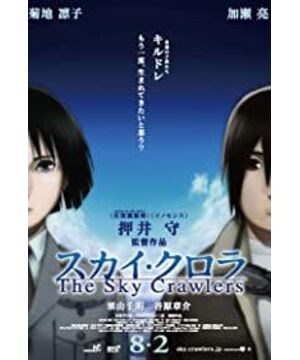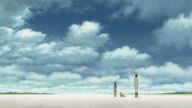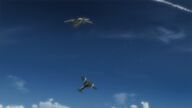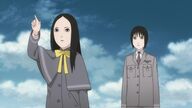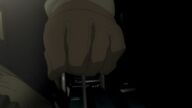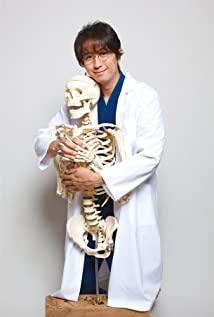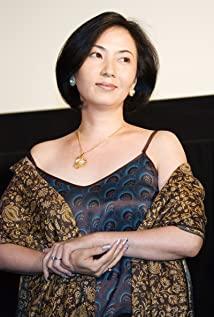---
Because I was interested in the original world view setting, I went to read the first volume of the original book written by Mori Hirosu. In the novel, Senboji showed himself as a fan of Shell and Grandpa Salinger. The narrative style paid tribute to "The Catcher in the Rye", citing several "Nine Stories", and even called the heroine's name "Grass". Pheasant Susu"... The whole novel is told from the first-person perspective of Hannan Yuichi, the son of battle, and maintains the cynical tone of "Watcher" Holden throughout.
As fans of both the Shell and the old man, this novel should have been very appealing to me, but unfortunately it is not. Because Mamoru Oshii has made a strong transformation and characterization in the presentation of the story: on the premise that the basic settings of Son of War and Reincarnation after death remain unchanged, the film features cool-toned pictures, simple lines of characters, monotonous actions, Short dialogue, frequent front and back shots, slow rhythm, etc., make the whole world present a distinct dystopian temperament. With such preconceived visual impressions, readers returning to the novel have a hard time accepting the beat-in-the-wheat narrative—think Holden-like Winston speaking about 1984.
--Dystopia--
Oshii Mamoru's transformation of the world view setting is concentrated in the introduction of the role of Teacher. The prototype of Teacher, in the first series of the original novel, is a pilot with superb flying skills who did not mention his name. He appeared in an air battle group scene. The subsequent story of Sui Su only mentioned that he defected to the superior because of his preference for the aircraft type. A company that is hostile to Hydrosol (considering that Mori Hiroshi will continue to write this series, this should be a foreshadowing).
However, in the story of Mamoru Oshii, the teacher's black cat logo shot down two enemy planes like a ghost in the opening scene, and in the climax scene at the end of the film, he destroyed Yuichi's plane with the impossible flight action of the spiral wing to end the story. . In the middle narration, Teacher (reminiscent of the big brother) becomes the one who first piloted the plane, and implies that there is a constant connection with the water element. This has led to a lot of discussion and speculation about Teacher's identity in the comments. For example, Teacher is the cloned prototype of all immortal sons, and Teacher is an artificial intelligence expert system.
Although these discussions are a bit over-interpreted, Oshii Mamoru deliberately maintained the mystery of the role of Teacher in the story, which led to a variety of possibilities for Teacher's background. What I'm more interested in is that since Mamoru Oshii's revised world exudes a strong dystopian atmosphere, what kind of functionality does the Teacher under the spotlight have in dystopia?
--Balanced power--
Intuitively, it can be found that Teacher exists to balance the strength of both sides of the battle. In the world of Air Killer, the war is fought between two companies that host the war show, and the two companies form a kind of tacit understanding in the process of the war show. For example, it is mentioned in the original work that technological progress is not supported by the company, because the technological breakthrough of one party will break the balance of strength of both parties. Another example is that all battles take place at agreed-upon locations and times—although a sneak attack on the base where Sui Su is located, it is not difficult to judge that the sneak attack was also pre-arranged.
However, the two opposing structures are always unstable. In 1984, Orwell constructed a triangular structure, the result of which was that the strength of either side would lead to a combined counterattack by the other. The world of air killer novels lacks such a guarantee mechanism. For example, in the novel, Sasakura's private experiments and modifications to the plane are invisibly eroding the overall balance. Of course, it cannot be ruled out that this is due to Morihiro Mori's hope of disintegrating the novel world at the end of the series. Deliberately left flaws. But in Mamoru Oshii's 2-hour movie universe, this dystopia must be stabilized and the invincible Teacher emerges. Whether Teacher is a conspiracy of the two companies or a creation out of thin air, he acts as a neutral weight to ensure the balance of the game after he appears. Once a company is so strong for some reason that it threatens the stability of the entire structure, Teacher "moves" to the other side. Because Teacher's invincibility is an axiom-level setting in the world view, as long as Teacher is always neutral, this game can't be over.
-- Civilians and Heroes -- Once the
dystopia is structurally stable, it must also ensure that the actions of individuals do not destabilize the system, intentionally or unintentionally. This is also the theme in the collection of dystopian novels, and the trilogy "Us", "Brave New World" and "1984" all make a fuss about this theme. But in addition to the brainwashing, surveillance, and violence of traditional dystopias, there is something special about aerial killers.
First of all, the dystopian boundaries of the air killer are limited to the companies of the war show. The individuals in the dystopia are immortal sons who are produced to fight, and the civilian life outside the boundaries is still "happy". Therefore, the setting is to prevent the Eternal Son from escaping into the civilian population. This is limited by the basic setting, the immortal son will always remain in the state of a child due to genetic reasons and cannot grow up. This highly identifiable feature guarantees that, although the escape of a few cannot be ruled out, widespread "civilization" is unlikely.
Another factor that must be considered is that war is the breeding ground for heroes, so companies must also prevent the tendency to "heroize" individuals. This is a huge destabilizing factor once an individual gains traction through constant victories. More in line with the previous discussion is that personal "heroization" is an uncontrollable factor that affects the balance of the battle. Here the Teacher shows the value of its balancing weight. Teacher himself is the biggest hero in the system, a terrifying reality. The existence of this invincible hero makes it impossible for others to be heroic. Teachers are undefeated and teachers are controllable, so the system is not threatened by the "heroization" of individuals.
--Choice--After
such a setting is completed, this film, like other dystopian works, aims to express the awakening and resistance of individuals in this context. The behavior of Sui Su and Youyi is aimed at the above "civilianization" and "heroicization".
"That gave birth to a child... The child gave birth to a child..." Mitsuya said. It can be seen from this that Sui Su has gone beyond what ordinary people think of as an immortal son—she stopped flying, became a commander, gave birth to children, and even killed her companions. This is exactly the same as "adult". In the end, she even wanted Yuichi to kill herself, so at least in this reincarnation, she almost had the right to decide her own life and death. The resistance of the water element is in the hope of detaching himself from the whole system by turning himself into an "adult". But "this alone is not enough?", Which is a function of the South excellent last words:
"Even the way through countless times,
can come to places never set foot.
Because it is the road traveled numerous times,
The scenery can change.
Isn't that enough?
Because it's just that, isn't it enough?"
"Popularization" is always a personal escape, which is cheap after all. Although the water element is fiery, how different is it from the decadence and laziness of Tokino? How can it affect the operation of the system? After reincarnation, can everything have to start all over again? These constitute Yuichi's question: Since you can enjoy the ever-changing scenery on the same road, do you need to change it? Or, since the eternal children have inner freedom, is it necessary to fight for outer freedom?
"Isn't that enough?" Yuichi gave his answer.
"It's just because you've traveled countless times that the
scenery changes.
Isn't that enough?"
"I'll shoot you down, Teacher."
-- the end -- the
night is still long, and the
dawn is still far away.
In this darkness, the
fearful became a dog, the despicable became a fox, the
proud became a wolf, and the contemptuous became a pig.
However, no matter what it turns into, leave the call
in your heart, and call out a bolt of lightning that day to ignite yourself.
Even if it can't light up the whole night,
it might as well provide a little warmth for the one-foot-three beside him. Maybe that's
all
that can be done before it's over .
Original: http://sakinijino.com/archives/1433
View more about The Sky Crawlers reviews


